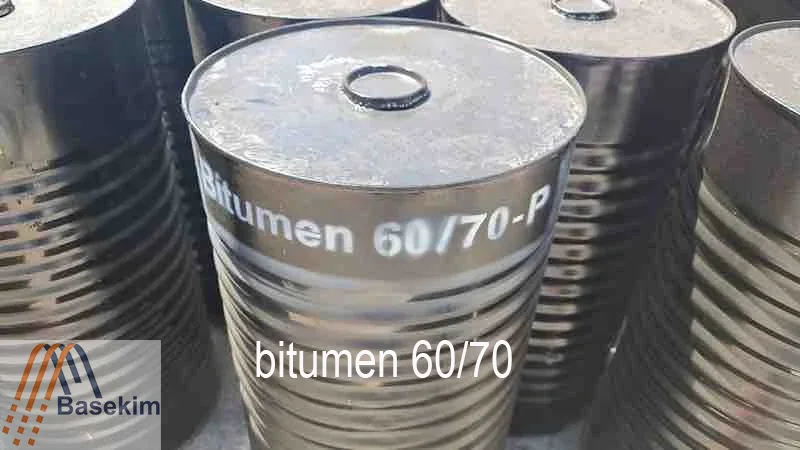MSDS of Bitumen 60/70

Bitumen 60/70: Reliable Asphalt for Roads, Waterproofing, and Infrastructure
When it comes to building roads, bridges, or waterproofing systems, choosing the right material is crucial. Bitumen 60/70—often referred to as asphalt 60/70—is a trusted and versatile solution used across various infrastructure projects. Not only is it durable, but it also performs well in a wide range of environmental conditions, particularly in countries like the UAE and Turkey.
At Basekim, we consistently deliver high-grade Penetration grade bitumen tailored for different climates, construction needs, and industry standards.
What is Bitumen 60/70?
In simple terms, bitumen 60/70 is a semi-solid form of petroleum used extensively in road construction, waterproofing, and protective coatings. The numbers “60/70” refer to its penetration value, which indicates its hardness. Specifically, this bitumen allows a needle to penetrate 60 to 70 tenths of a millimeter under standardized conditions.
This balance in consistency makes it soft enough to remain flexible in cooler climates, yet firm enough to withstand heavy traffic and heat. Consequently, it’s widely chosen for road surfaces that need both resilience and longevity.
Why It’s Ideal for the UAE and Turkey
Different environments demand different properties from construction materials. The UAE, for instance, experiences intense heat, while Turkey spans multiple climate zones with varying temperatures.
Because of its balanced composition, Bitumen for road construction is effective in both cases. Here’s why:
Firstly, it resists cracking in cold conditions
Secondly, it remains stable even under high heat
Moreover, it’s waterproof and oxidation-resistant
Finally, it delivers reliable performance at a reasonable cost
Due to these properties, Bitumen 60/70 has become the preferred bitumen grade for municipalities, highway authorities, and contractors alike.
Safety Comes First: Handling Hot Bitumen
While bitumen is incredibly useful, it must be handled with care—especially when heated. It needs to be warmed to around 160°C before use, making safety precautions essential.
Skin Contact
Hot bitumen can cause severe burns. Therefore, if Bitumen 60/70 comes in contact with your skin:
Immediately cool the area with cold water
Do not attempt to peel it off; allow it to harden
Then, seek medical attention as soon as possible
Inhalation Hazards
In enclosed areas, bitumen fumes may contain hydrogen sulfide (H₂S)—a potentially toxic gas.
As a result, it’s important to use adequate ventilation
When necessary, wear respiratory protection
If symptoms like dizziness or shortness of breath occur, move to fresh air
Eye Contact
In the unlikely event that bitumen splashes into your eyes:
Rinse immediately with clean water for at least 15 minutes
Contact medical professionals without delay
Technical Specifications at a Glance
Bitumen 60/70 consists of heavy hydrocarbons and complex molecules. Therefore, Bitumen 60/70 is thermally stable under most conditions, although it should never be overheated or mixed with water.
Typical properties include:
Penetration (25°C): 60–70 dmm
Softening Point: 48–56°C
Flash Point: ≥ 250°C
Boiling Point: > 450°C
Specific Gravity: 1.00–1.06
Solubility in Water: None
Thanks to its stability, Bitumen 60/70 remains reliable even in demanding regions like Dubai or Ankara.
Best Practices for Bitumen 60/70 Storage and Handling
To maintain its quality and ensure workplace safety, Bitumen 60/70 must be stored and used correctly.
Always keep storage tanks grounded to prevent static discharge
Furthermore, maintain proper ventilation to avoid fume buildup
Never let water mix with hot bitumen—it can cause dangerous splattering
Equip the workspace with emergency eyewash stations and safety showers
Use PPE such as flame-resistant clothing, gloves, and face shields
At Basekim, our logistics and technical teams follow these safety measures throughout the delivery and transfer process.
Environmental Impact and Disposal
Although bitumen is chemically stable, it must be disposed of responsibly. Since it doesn’t degrade naturally, improper disposal can lead to environmental harm.
Where possible, recycle or reuse excess material
Never release it into sewers or open water
Contaminated material should be sent to licensed facilities for treatment or incineration
Follow environmental regulations specific to your country—whether you’re in Turkey, the UAE, or elsewhere
Transportation Standards for Bitumen 60/70 You Should Know
Bitumen 60/70, particularly when transported hot, is classified as a hazardous material. However, with the right documentation and handling, it can be moved safely and efficiently.
Key transport classifications:
UN Number: 3257
Hazard Class: 9 (miscellaneous hazardous substances)
Packing Group: III
Hazchem Code: 2W
Whether you’re transporting it by truck, rail, or sea, Basekim ensures compliance with international regulations.
Why Choose Basekim for Bitumen 60/70?
We understand that your project depends not just on the material—but also on timely delivery, technical accuracy, and support.
Here’s what sets us apart:
Reliable product quality, tested to ASTM and EN standards
Timely logistics, serving both the UAE and Turkey efficiently
Technical support, available from consultation to implementation
Custom supply options, suited for small jobs or large infrastructure projects
Because of this, we’ve become a preferred partner for both public and private sector clients.
Ready to Build? Let’s Talk
In conclusion, bitumen 60/70 remains a foundational material for modern infrastructure. Its durability, versatility, and cost-effectiveness make it ideal for everything from highways to roofing systems.
If you’re planning a project in Dubai, Istanbul, or anywhere in between—let’s work together. We’ll make sure you get the right material, at the right time, backed by the right expertise.
Contact Basekim today for a quote, SDS, or further technical information.

